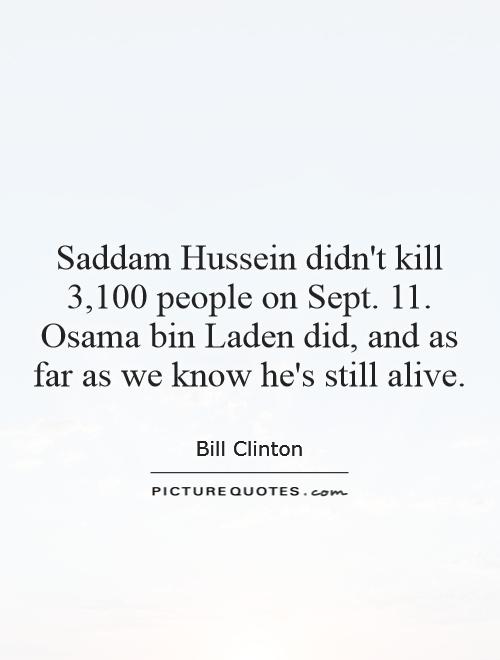Saddam Hussein didn't kill 3,100 people on Sept. 11. Osama bin Laden did, and as far as we know he's still alive

Saddam Hussein didn't kill 3,100 people on Sept. 11. Osama bin Laden did, and as far as we know he's still alive
The statement that Saddam Hussein didn't kill 3,100 people on September 11th is a fact that cannot be disputed. The attacks on the World Trade Center and the Pentagon were orchestrated by Osama bin Laden and his terrorist organization, Al-Qaeda. It is important to remember this distinction, as Saddam Hussein was the former dictator of Iraq and had no direct involvement in the events of September 11th.However, the mention of Saddam Hussein in this context brings to mind the controversial decision made by former President Bill Clinton to launch military strikes against Iraq in 1998. This decision was made in response to Iraq's refusal to comply with United Nations weapons inspections and its continued pursuit of weapons of mass destruction. The strikes were aimed at degrading Iraq's ability to produce and use such weapons, but they also had broader implications for the region and the world.
The decision to launch military strikes against Iraq was met with both support and criticism. Supporters argued that it was necessary to prevent Iraq from developing and using weapons of mass destruction, while critics argued that it was an overreach of American power and could have unintended consequences. The strikes also raised questions about the role of the United States in the world and its use of military force to achieve its foreign policy goals.
In the years following the strikes, the United States would become more deeply involved in Iraq, eventually leading to the invasion of the country in 2003. This invasion would have far-reaching consequences, including the overthrow of Saddam Hussein's regime, the rise of sectarian violence, and the emergence of new terrorist threats in the region.












 Friendship Quotes
Friendship Quotes Love Quotes
Love Quotes Life Quotes
Life Quotes Funny Quotes
Funny Quotes Motivational Quotes
Motivational Quotes Inspirational Quotes
Inspirational Quotes